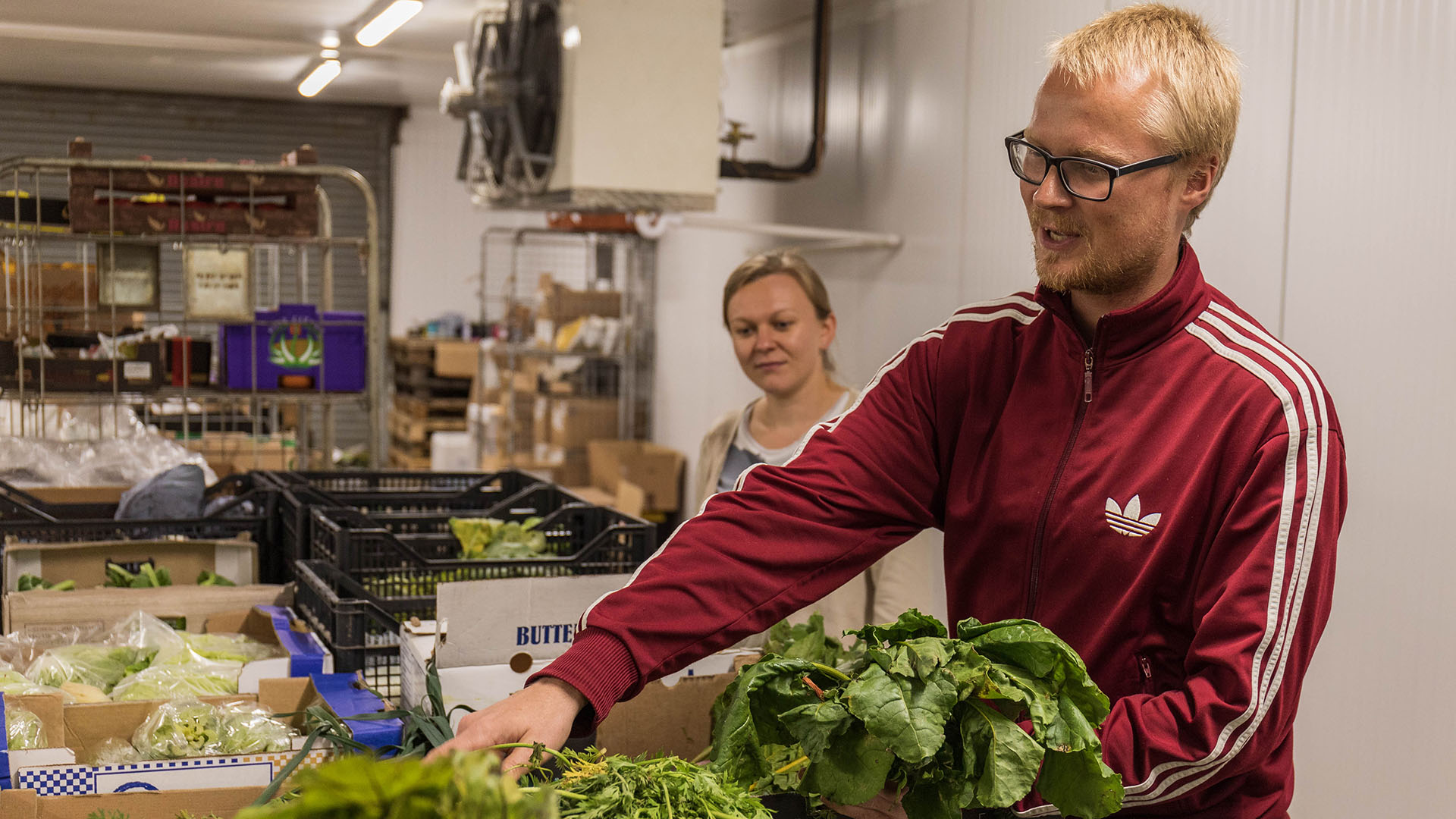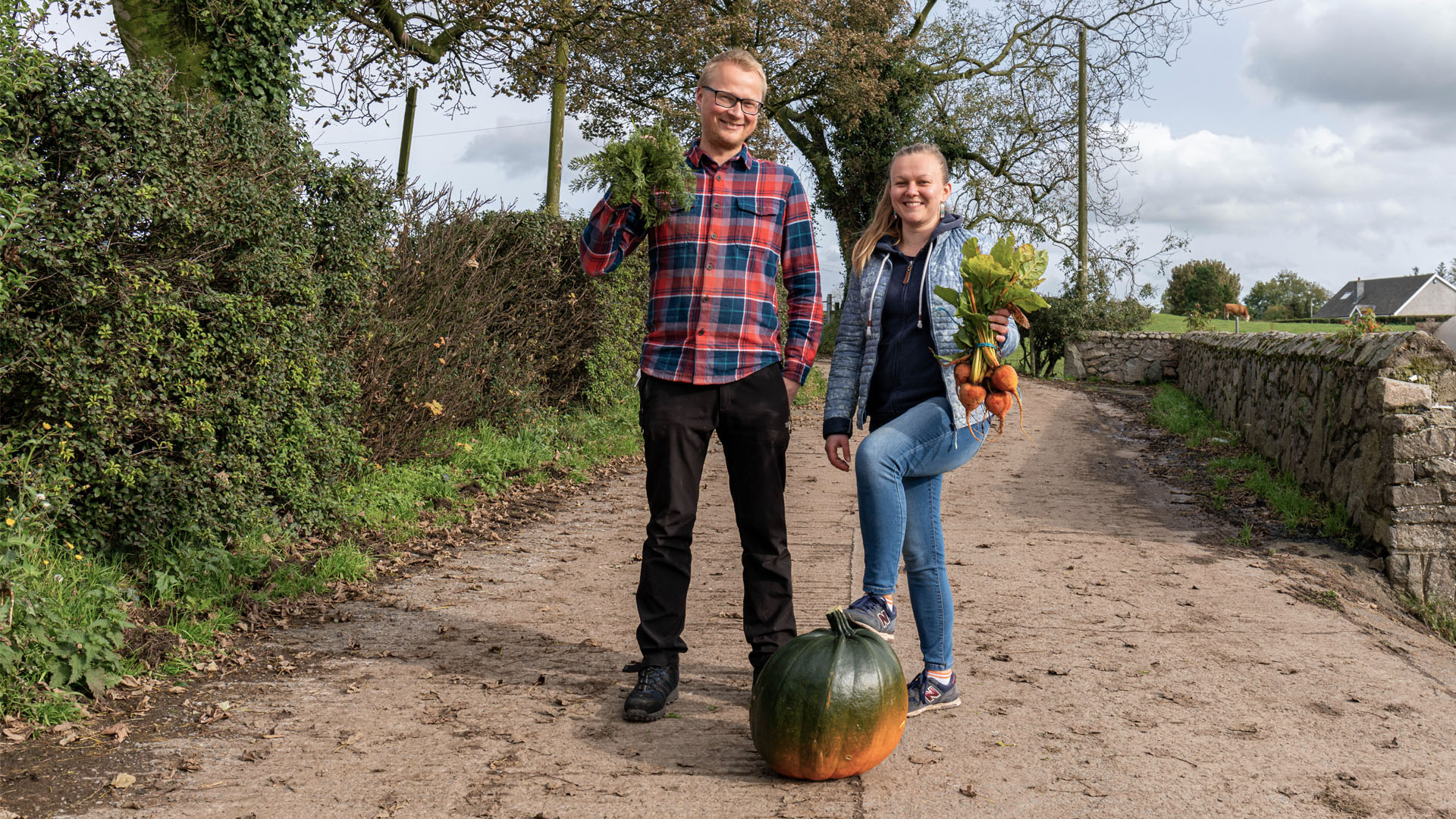Our first series explores how local chefs, restaurateurs, artisans, brewers and distillers are crafting some of the best food and drink you may or may not have heard of, furthering Northern Ireland’s culinary scene and adapting to serve local communities over the pandemic period.
I think food, culture, people and landscape are all absolutely inseparable.
Anthony Bourdain
The proprietors of Farm Next Door couldn’t agree more. Emilia Klak and Marcin Piotrowski, partners in life and in business, founded Farm Next Door for one reason – they missed the fresh produce they had enjoyed in their native Poland. This couple soon realised how much the rich Northern Irish soil had to offer.
Over time, they developed relationships with local farmers and quickly evolved into a formidable online grocery service, which would then provide them the ability to bring in many of the things they love from their homeland. Sometimes it takes an outsider’s perspective to bring us ‘back to our roots’. This is their story:
How did you get your start?
[Emilia] We’ve been at this for four years now. It was really a selfish idea, at first. I really missed Polish potatoes and I figured the best way to find the equivalent was to buy directly from local farmers. I was not disappointed!
We then realised that we can buy batches and sell them ourselves while promoting these local farms along the way. We put an advert up on Facebook’s Marketplace, not expecting much to happen. The next day, we had 10 customers. It’s no secret, the Irish like potatoes! So that’s how we got our start.
Tell us about your operation?
[Marcin] Well, we’ve only recently moved into our new facility here in south Belfast. We’ve set up a factory-like production line. The idea here is that two to four people can work each line simultaneously. Products are organised around scales. It’s set up so that you’re continuously moving forward towards the trucks and never have to get in your colleague’s way – well, in theory, anyways!
It has become very efficient over time. Emilia has a farmer’s background I’ve worked as a manager of a fast food chain and later a supermarket, so I think our skills complement each other.
We buy most of our products to order each day. At the end of the day, there is rarely anything left. We try to not keep anything in reserve. This ensures that we are always selling the freshest products possible. You can view our schedule on our website.
Delivery Times
| Area | Time |
|---|---|
| Comber, Newtownards, Dundonald | 2.00pm - 3.00pm |
| Holywood, East Belfast | 2.30pm - 4.30pm |
| South Belfast, Dunmurry, Carryduff | 4.00pm - 6.00pm |
| West Belfast, North Belfast | 5.00pm - 7.00pm |
| Carrickfergus, Newtownabbey | 6.00pm - 9.00pm |
What products do you offer?
Well, to start, we’ve got vegetables of all kinds, hard and soft fruits and virtually anything that grows on local soil and trees.
[Emilia] After we started with potatoes, people started asking us if we had other local root vegetables. We saw quite quickly that there was a demand for this kind of service. We then started collecting local herbs and a wider variety of vegetables and just kept adding to our repertoire.
What is “Polish Range”?
This is 2020 Northern Ireland – there are a lot of us Poles and people from other countries here now. Poland is a large country with excellent products that permeate central and eastern Europe. Wanting to serve migrant communities, we started to add Polish products. We now have a host of products, including things like Polish cucumbers, raspberry tomatoes and all of our famous pickled products, like sauerkraut and our famous sorrel.
How have locals taken to Polish products?
We suspected that some locals didn’t feel comfortable going into Polish shops. I think that’s where our online presence really helped. Our categories in the online shop are working well for people. For example, when people go to the ‘potatoes’ category, they see that we offer ten different types. They may order one type and then branch out on the next order.
Many of our potatoes are indigenous, but a lot of people have also really been enjoying the Polish varieties we offer. One lady told us she’s crossed off the whole list now and has been enjoying our potatoes from across Europe!
What’s even greater, is that local farmers have been starting to farm Polish products, which we are very humbled by. We went to local farmers and asked, “Can you do this for us?” Two years later they were growing raspberry tomatoes and yellow beans. This saved us ‘food miles’, increased our shelf-life and broadened the local farming scene.
What else do you offer?
[Marcin] Recently, we’ve been adding more fruits from around the world – oranges, bananas, mangoes – just for variety. Our operation is now evenly divided between local, Polish and various wholesale products from excellent global vendors.
We have some English jams and raw honey from Poland. We offer Irish virgin rapeseed oil and various homemade sauces. We sell milk, free range eggs and plant-based drinks all made locally.
Some of our local suppliers are really branching out, producing things like black kale, purple potatoes, beans, peas, strawberries, black currant, gooseberries, rhubarb and early potatoes – things you wouldn’t have seen here 5-10 years ago that we are now selling by the bulk.
We’ve developed a Polish bread with our baker, too, which is something we really missed after moving. Locals are eating it up!
Tell us about your approach to distribution?
Often times, with foreign products, the transportation costs are more expensive than the product itself. That’s what some people don’t realise. Everyone is getting squeezed, despite the demand for it.
However, we don’t get bogged down by issues in the wider industry. Our concern is quality. We work with independent producers who also need to pay the bills. This model is built on trust and mutually-assured quality of products and service.
There is a lot to consider, from seasonality, shelf-life, market demands and product availability. It’s a lot of juggling to make ends meet, but it’s worth it knowing we’re building a quality service that is elevating the local producers, providing a more enjoyable food experience for customers and, ultimately, making people healthier.
Do you sell more to migrants or locals?
[Emilia] It’s about half and half. Since we’ve expanded and are offering a lot more products, we have customers from all walks of life.
More local people are trying new products. I’ll see on their weekly grocery lists that the range of what they’re buying is expanding. They’re curious and they want to try new things. More people are cooking now because of Covid, so I think that’s adding another layer to their culinary adventures. People are sharing cultural and family recipes, enriching everyone involved.
What have you noticed about predominant local food culture?
[Marcin] There is a focus on price here, which is, of course, understandable. But I think the idea of paying a bit more for a higher quality product isn’t quite embedded in the culture yet. It would be great if Farm Next Door could offer a cheaper range of products, but it’s impossible to do without compromising quality, which we simply refuse to do.
How have you adapted to Covid-19?
Covid-19 is a tragedy. However, one positive thing for us is that people resorted to ordering more of their groceries online.
From working in supermarkets, I saw people buying canned food and toilet paper in a panic. I was like, “Well, eventually they will start buying potatoes!”
I didn’t expect that it would be so busy. One day, it became apparent that I wasn’t going to be able to do both my full time job and this, so I just rang my work and said, “I’m done!”
We had to make a choice: either we go ‘all in’ and develop the business or buckle under the pressure. I’m very glad we chose to continue, but it wasn’t an easy one to make at the peak of the crisis, trust me!
Amidst the madness, we had to take on new staff and train them, which was an unfair situation for them to get thrown into, but they adapted extremely well.
Let’s just say, there was a lot of sleepless nights. We didn’t have a real break for two months!
Now that Covid has calmed, what does the future hold?
[Emilia] Well, for one, we’ll be adding microgreens soon. In general, we’re looking at options for more plant-based foods.
We have offers from some restaurants, which is very exciting. We may eventually open up our own shop in addition to the online store.
[Marcin] With the turnaround from Covid, we haven’t even written down our policies and procedures yet – it’s just stuck somewhere in the back of my brain! So, hopefully, I’ll find the time to do that and we can continue to build the business.
What do you miss the most about Poland and what do you like that most about NI?
[Both simultaneously] We miss summer. We miss proper heat! We missed the vegetables at first, but that’s no longer an issue.
[Marcin] We really love it here. We love the north coast. Whenever anyone visits, we don’t even think about it, we just take them to the Giant’s Causeway and Bushmills. I know it’s probably cliché, but it really is one of the best drives in the world. Or maybe it’s the whiskey – who knows?!
So, why should people buy ‘local’ vegetables?
I can’t convince anyone to buy from us or other local vendors. All I can say is, a good portion of our sales go back to the farmers, so it creates its own local economy and helps everyone out. All of our providers are fresh and sustainable; they don’t use preservatives, pesticides or hormones. We love doing business with them and are happy to promote them whenever possible.
[Emilia] We have a saying, “Back to the roots.” That quote sums up all that we are about. With us, you’re not supporting some big company, you’re supporting the community.
In short, buy ‘local’ because you’ll be healthier and happier – it’s that simple.
What’s your message for the community at this time?
Get back to “your roots” and eat your veg!!!



